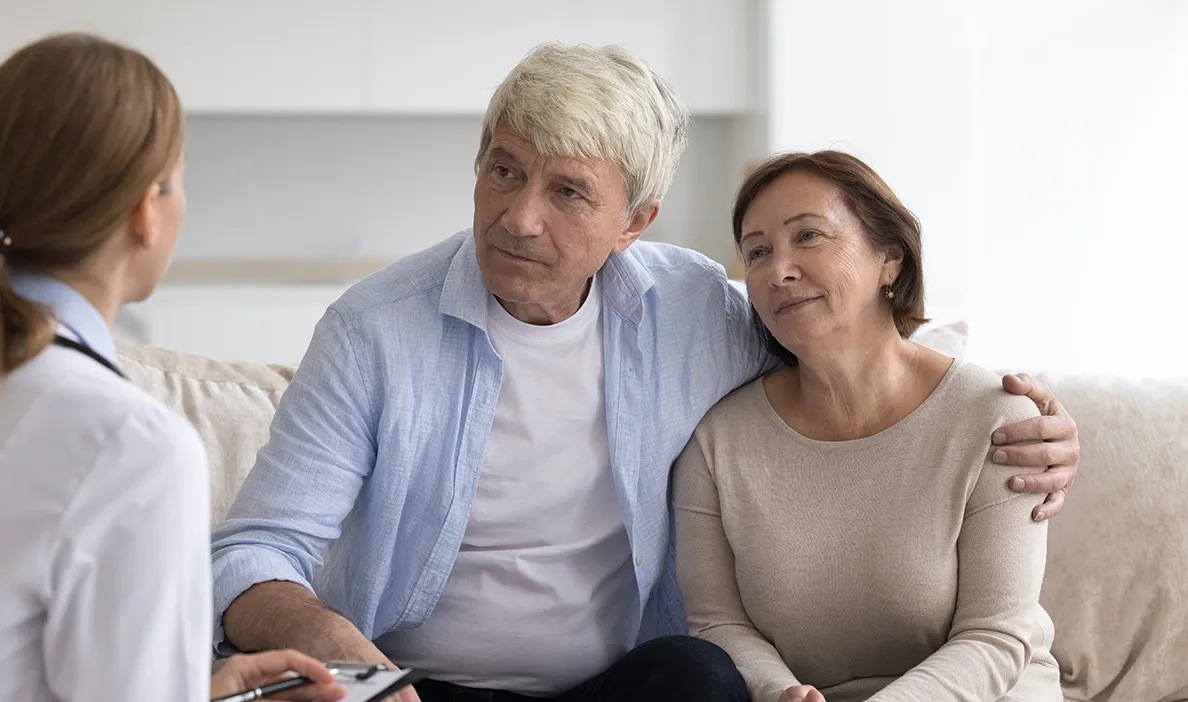When diagnosed with cancer, you may have lots of questions. Some may come to you straightaway, while others may take a while to spring to mind. Some questions you may not have even thought of yet.
Below you can find some commonly asked questions about cancer and brief answers that you may find useful. If any questions remain, or there is anything you wish to learn about in more detail, we suggest reaching out to your doctor or healthcare team.
About Cancer
Cancer a disease in which the building blocks of our bodies, known as cells, grow in a different way to normal, healthy cells. Instead of dying when they are damaged, cancer cells continue to survive in the body and divide uncontrollably to make more cancer cells.1,2
Tumours are lumps made up of cells. Tumours can either be cancerous (known as malignant) or non-cancerous (known as benign). Cancerous tumours tend to grow faster than non-cancerous tumours and are more likely to spread to different parts of the body.3
Cancer usually starts in one part of the body and is named after this—for example, breast cancer. Sometimes the cancer spreads to other parts of the body. This is called metastasis or secondary cancer. Cancer cells can move in the bloodstream from one part of the body to another, or through another system of tubes called the lymphatic system.1
Cancer can’t be passed from parent to child, but genes can. Genes are the instructions that our cells need to work. Sometimes genes go wrong, and they give the wrong information to the cell. The changes in the gene are called mutations and the result of the these is sometimes cancer.4
Some cancers may appear to run in families, and this may be because a gene mutation is inherited by multiple people in the same family. But not everyone that inherits the gene mutation will develop cancer. There are other factors that affect whether someone gets cancer or not.4
Less than 5 in every 100 cases of cancer are thought to be due to a mutated gene.4 Cancers that are most associated with genetic mutations include breast cancer, bowel cancer, stomach cancer and prostate cancer.5
Read more about Genes, Genetics and Inherited Cancers here.
Sometimes it’s hard to tell whether information you read online is reliable and trustworthy. A few sites we recommend for information about cancer include Macmillan Cancer Support (also known as Macmillan), Cancer Research, and the NHS.
See our page on Cancer Support Groups for a longer list of organisations that provide reliable information and support to people affected by cancer.
About Diagnosis
It’s important to see a doctor as soon as possible if you are experiencing something that is unusual for you. In many cases, the symptom won’t be caused by cancer. But if it is cancer, catching it early may lead to better outcomes.6
Going for tests and scans can be worrying. But there are some things you can do ahead of time to prepare yourself. Make sure you ask your doctor any questions you have about what to expect.
To help you and other people going through medical tests and scans, Pfizer has developed Testing & Me. This is a virtual hospital experience that has been made to take you through what to expect for some common medical tests and scans. Visit our Testing and Me page to learn more.
If you have any doubts about your diagnosis or don’t feel well supported by your doctor, you may wish to get a second opinion. This would involve going to see another GP or specialist doctor. You may also wish to seek a second opinion when deciding a treatment plan.
It’s within your rights to ask for a second opinion. The NHS doesn’t have to provide one, but many doctors are happy to arrange a referral.7
About Treatment
Your doctor and healthcare team will let you know about anything specific you need to do before you start treatment. This may include ‘prehabilitation’ or ‘prehab’, which involves improving your emotional and physical health before starting treatment. Areas of focus may include weight, diet, exercise/physical activity, general health and mental health.8
You can read more about prehabilitation here.
Depending on your concern, you may wish to speak with your doctor, nurse, pharmacist or GP practice.
Macmillan provides a cancer support line, which offers confidential support to people living with cancer. You can find more information here.9
A clinical trial may be a treatment option for you. But there are some criteria that have to be met before someone can join a clinical trial – these are called eligibility criteria. It’s important you meet these before being considered for a clinical trial. Examples of eligibility criteria include age, which type of cancer you have, which other illnesses you may have, where you live, and so on.11
Read our page on Clinical Trials to learn more about them.
About Life
Everyone feels differently after finishing treatment. Some may feel positive and ready for the next chapter, while others may feel tired and worried about whether life will return to how it was before cancer. It’s important to remember you’re not alone in this.
You may find it helpful to connect with support groups for people in a similar situation to you. Visit our Support Groups page to see some groups that support people during their experience with, and after, cancer.
It depends on what the concern is. Your GP is a good person to speak to about any health concerns. They can then refer you to a specialist if you need them. For any worries about work, finances or relationships, you may wish to speak with a support group.
Macmillan also provides a cancer support line, which offers confidential support to people living with cancer. You can find more information here.9
References
- World Cancer Research Fund. Common questions about cancer. Available from: https://www.wcrf.org/preventing-cancer/cancer-prevention/common-questions-about-cancer/#how-does-cancer-spread [Accessed June 2025].
- Cancer Research UK. How do normal cells and tissues grow? Available from: https://www.cancerresearchuk.org/about-cancer/what-is-cancer/how-cancer-starts/how-cells-and-tissues-grow [Accessed June 2025].
- Cancer Research UK. How cancers grow. Available from: https://www.cancerresearchuk.org/about-cancer/what-is-cancer/how-cancers-grow [Accessed June 2025].
- Macmillan. Family history, genes and cancer risk. Available from: https://www.macmillan.org.uk/cancer-information-and-support/worried-about-cancer/causes-and-risk-factors/family-history-genetics-and-cancer-risk [Accessed June 2025].
- Better Health Channel. Cancer and hereditary. Available from: https://www.betterhealth.vic.gov.au/health/conditionsandtreatments/cancer-and-heredity [Accessed June 2025].
- Cancer Research UK. Signs and symptoms of cancer. Available from: https://www.cancerresearchuk.org/about-cancer/cancer-symptoms [Accessed June 2025].
- Macmillan. Getting a second opinion. Available from: https://www.macmillan.org.uk/cancer-information-and-support/treatment/your-treatment-options/getting-a-second-opinion [Accessed June 2025].
- World Cancer Research Fund. Prehabilitation for cancer. Available from: https://www.wcrf.org/living-well/living-with-cancer/cancer-prehabilitation/ [Accessed June 2025].
- Macmillan. Macmillan support line. Available from: https://www.macmillan.org.uk/cancer-information-and-support/get-help/macmillan-support-line [Accessed June 2025].
- Cancer Research UK. About side effects. Available from: https://www.cancerresearchuk.org/about-cancer/treatment/cancer-drugs/side-effects/about [Accessed June 2025].
- NHS. Clinical trials. Available from: https://www.nhs.uk/conditions/clinical-trials/ [Accessed June 2025].






